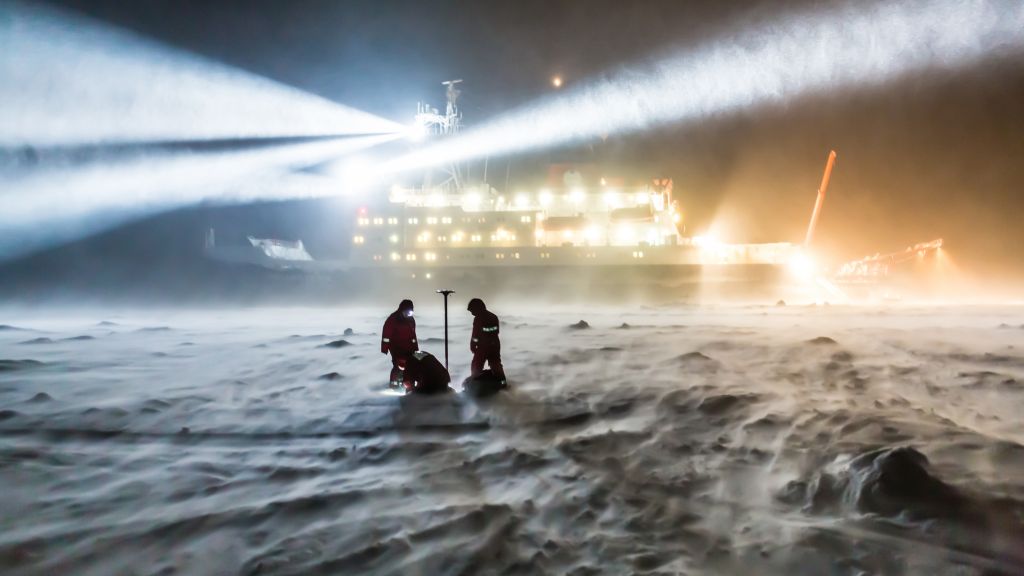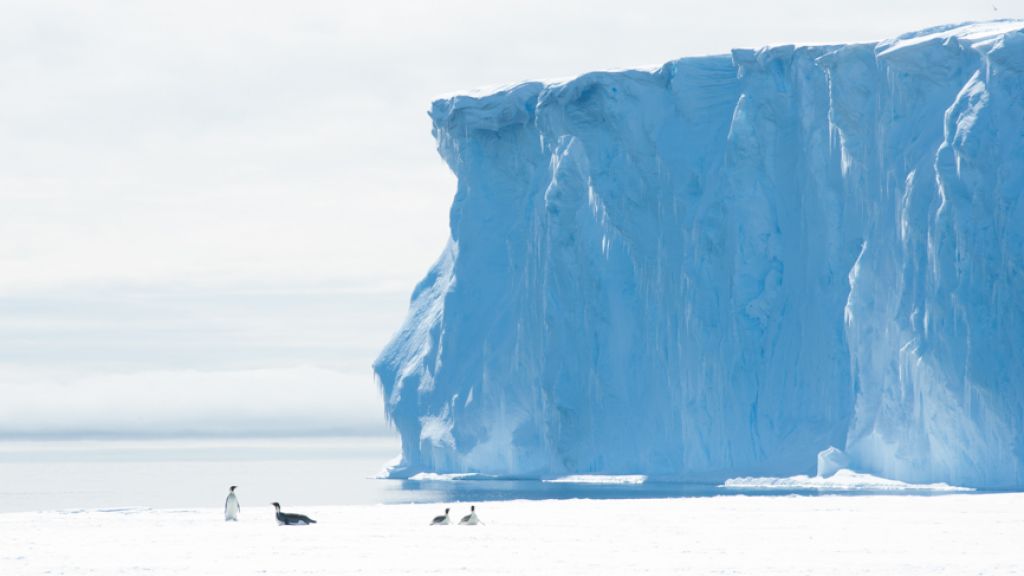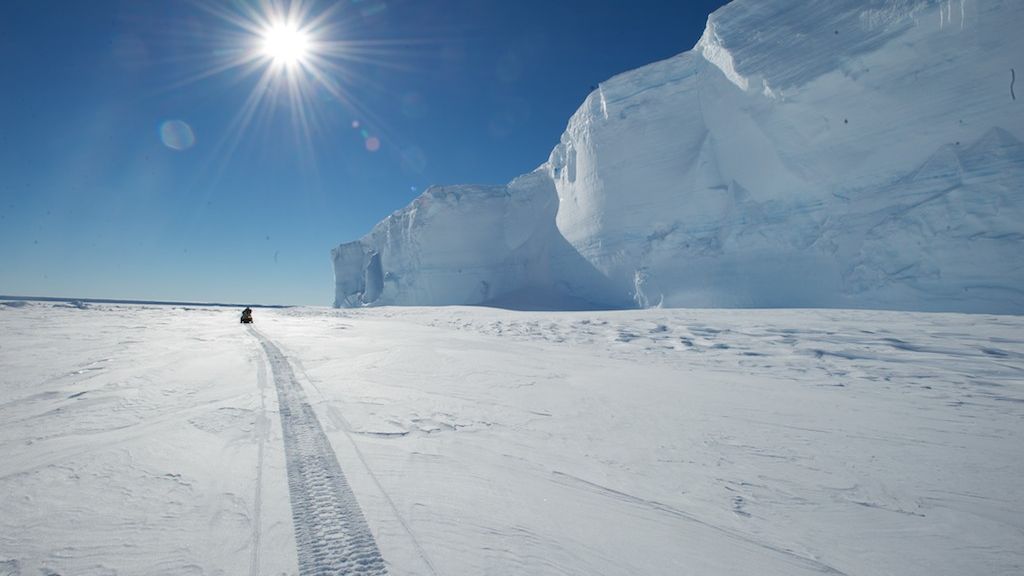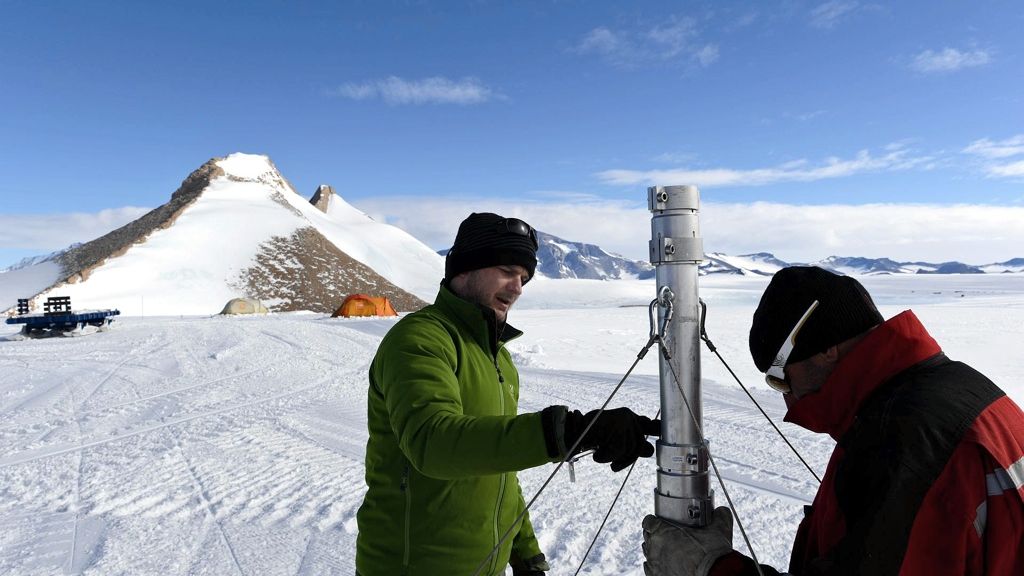Filming Ice People
Filming ice people
© Ice People / Dry Valleys Productions
ICE PEOPLE is a feature-length documentary that explores the physical, emotional and spiritual adventure of living and conducting science in Antarctica, Anne Aghion and her crew spent four months on the ice. This included seven weeks camping in the "deep field" with a small team of geologists searching for fossilized vegetation on Antarctic lakebeds estimated at 14-20 million years old. ICE PEOPLE was made with the support of the National Science Foundation's Antarctic Artists and Writers Program-which gave Aghion the longest film permit ever granted.
What is ICE PEOPLE about?
This is a film that takes you on a journey to what Antarctic scientists call the 'deep field'. It's a shared experience with four geologists - two investigators and two undergraduates - searching for fossils up in the mountains above the Dry Valleys in the Ross Sea region of Antarctica. The Dry Valleys are about 100km2 and part of the 2% of Antarctica that is not covered by ice. They are among the driest regions on Earth.
The chief investigators are called Allan Ashworth, a Paleo-Entomologist from North Dakota State University (NDSU), and Adam Lewis, a glacial geologist who is originally from Idaho, and used to be at the Byrd Polar Center in Ohio, but is now also at NDSU. Adam has been going back to this area for now ten years, and Allan previously spent a lot of time researching around the Beardmore glacier in the Trans-Antarctic mountains. Together, they are scouring across hundreds of miles to find tiny, critical signs of life deposited around 20 million years ago, at a time when Antarctica was rich in vegetation, and before it became glaciated for the last time. The timing of this glaciation remains the source of some debate, but their findings are that Antarctica froze over a very short geological period of around 200,000 years, about 14 to 15 million years ago.
And why does this matter?
The relevance of all this is complicated, but it is routed in our understanding of climate evolution and climate change over millions of years. It's less about figuring out global warming today, than about how climate shifts and evolves in general. I would say that it's more 'fundamental research', than research dictated by events - and this even if it helps provide a clearer perspective on present change and the future of our planet.
Following in the footsteps of these scientists, you were in a unique position to observe the painstaking process of science, what did you learn and take back from this? Did it carry through in your work as a filmmaker?
When I applied to the US National Science Foundation which supported me through their Antarctic Artists and Writers programme, the program officers steered me towards the larger Antarctic research programmes such as for example ANDRILL. But what I quickly realised through this process of selection was that what was really interesting to me, and was going to allow me to get the kind of close access I needed to make the film I wanted to make, was to be with and follow a small group of scientists for a long time - and that there was less and less of that type of science taking place as larger, more high tech programmes took over an increasing amount of resources. When I found Adam and Allan, I thought this was the right group. And on top of it, they were going with two undergraduates, which made it even more relevant.
What I really wanted was to focus on something that really depended on our creative process. As Adam puts it in the film: A process that is more about our brain, than about million dollar machines. And yes, little by little I realised that this was a similar process to the one that I go through when I make a film: When I go looking for something, but am not really sure what it is. This feeling that there is something there, but that I'm in the dark until I find it.
And then, in the same way Allan and Adam got back to the lab with their samples, I came back with my footage, and I tried to find the meaning of the experience and material through the editing process. It's about the process of inquiry, and the difficulties of maintaining ones motivation in the day to day grind of the search. This is the same in both science and filmmaking.
What about Antarctica as an environment and continent? You experienced its full beauty and harshness. What are your feelings towards it on the back of this experience? Do you feel it has a special importance and relevance? Why?
Speaking personally, this was not my first visit. I had been to Southern Chile some 14 years ago and felt its magnetic draw. This is when I traveled down to the Antarctic Peninsula. If I had to define my time on the Ice in one sentence that encapsulated the whole experience, I would say that it is about our 'sense of place'. It re-centers you in a very fundamental way that is almost imperious. You cannot escape yourself or your surroundings. And it's very appeasing. It's something I had already experienced a bit during my previous travels to the Peninsula, but this time it was even clearer.
Your camera takes its time in capturing both the environment you're in and the people you're with. There's a constant shift between the boundless vistas and the social claustrophobia you're imbedded in. Would you say your experience with the US Antarctica Programme was more about wilderness or community?
The camera does go back and forth to give a sense of the shock of scale of the continent for humans there. I would say that my experience with USAP was neither about wilderness nor about community, but rather about overcoming personal challenges. You always hear that the hardest part about these very physical experiences like camping for weeks in the mountains of Antarctica, or mountain climbing, or crossing the ocean alone on a sailboat are dealing with what's going on in your head, and it turns out it's true - not just overcoming the physical hardship, but also the routine of the work - and that's what stands out, and stays with you in the end. I try to convey this through the film, and I hope I succeed a little bit.
- ICE PEOPLE premiere screenings will take place in Vancouver on October 3rd and 9th, Paris on October 10th, and New York on October 16th. See the ICE PEOPLE website for tickets and venue details.
- Ice People will air on ARTE as part of "Grand Format" on November 11 2008 at 10:55pm






